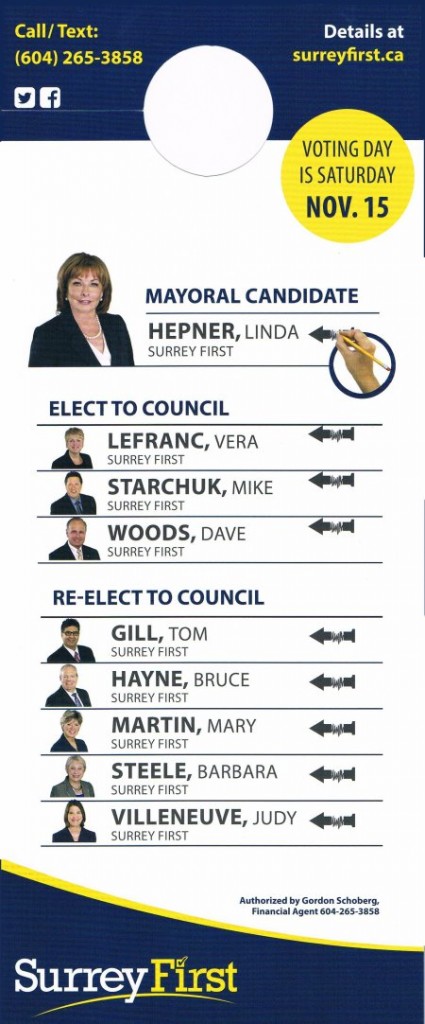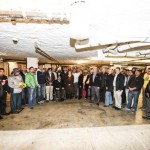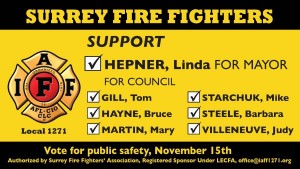Surrey First Door Knocking
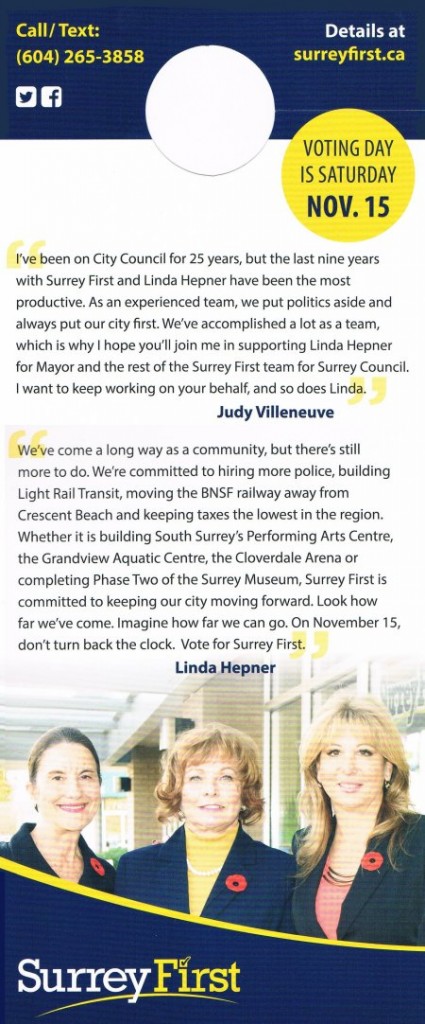
|
|
|
Today, folks from all over Surrey gathered together, and then spread out to knock on doors… to support Surrey First, and remind Surrey voters:
“Look how far we’ve come… Imagine how far we can go!”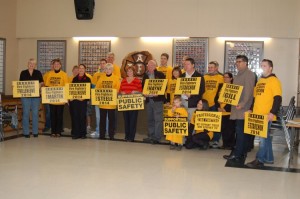
Volunteers, Surrey Fire Fighters, Councillors and Candidates all came together at various locations, for Surrey First.
Above is a photo of the Surrey First Team that assembled at ‘The Barge’ – the Surrey Fire Fighters’ Hall in Newton. Below is a photo from another location, with the Surrey First Candidates and volunteers ready to start door knocking for Super Sunday!
At the bottom of the post, are some other photos from the event, and from candidate Mike Starchuk, out door-knocking and engaging voters in Surrey.
On the left, above, are the door hanger brochures.
Today, Surrey First volunteers successfully reached out to thousands of households, asking them to allow us to continue the good work of the Surrey First Team… building a better Surrey!
Saturday, November 15th is Voting Day… make sure to have your say!
Find out more about Surrey First’s candidates and platform at SurreyFirst.ca
(Click on any of the images to open them in a pop-up viewer.)
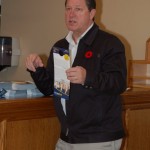 |
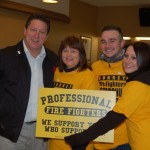 |
 |
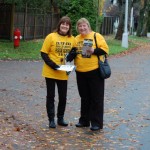 |
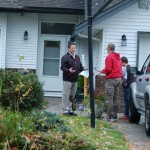 |
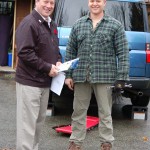 |
BC Professional Fire Fighters’ Association Endorsement
In May 2014, at the BC Professional Fire Fighters’ convention, over 175 delegates from 41 BC Fire Fighter Union Locals, bestowed Mike Starchuk with an Honourary Membership to the British Columbia Professional Fire Fighters’ Association (BCPFFA).
This honour was in recognition of his years of selfless work on behalf of his fellow fire fighters throughout the Province of British Columbia and the International Association of Fire Fighters (IAFF). Starchuk has worked tirelessly in assisting fire fighters with resolving work related injuries and in improving and maintaining their overall health and wellness. Surrey Fire Fighters’ Association President Mike McNamara stated, “Mike has been their anchor with his work and support of firefighters and their families, when they needed it most.”
You can read more about Mike’s selfless work on behalf of BC Fire Fighters, his community activism, and long history of volunteering and community involvement, here: https://surreyfirefighters.com/
On November 3rd, Mike Starchuk and the Surrey First Team were honoured to be endorsed by the BC Professional Fire Fighters’ Association, because of their support for Fire Fighters, and public safety issues.
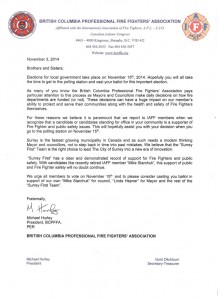 You can read the full text of the BC Professional Fire Fighters’ Association endorsement of Mike and the Surrey First Team, here: BCPFFA endorsement
You can read the full text of the BC Professional Fire Fighters’ Association endorsement of Mike and the Surrey First Team, here: BCPFFA endorsement
– – –
(It should be noted that this endorsement is in addition to the previously given endorsement by the Surrey Fire Fighters – Local 1271, of Mike Starchuk and current Surrey First City Council members)
What The Other Issues Are
Public safety is on the top of everyone’s mind this election and I assure you that the Surrey First team has an excellent plan in place to address today’s needs and requirements, and to proactively look at future public safety needs. In this post, I will conclude my list of ideas and initiatives which I bring to the Surrey First team and hopefully to a seat on Surrey City Council.
Our Senior Citizens
As the Fire Department liaison, I sat on the Seniors’ Advisory and Accessibility Committee (SAAC) from February 2013, until my recent retirement. This Committee is made up of City staff and community groups and advocates who have a passion for ensuring our Seniors have a voice in our City.
Our Seniors are one of the most cherished resources we have in our community. They are our pioneers and historians and they should be respected and honoured for what they have achieved and contributed.
We need to ensure that our Seniors have access to resources to keep them physically and socially active. The SAAC focuses on safety, health and wellness, transportation and mobility, housing, buildings and outdoor spaces, as well as legal issues such as power of attorney, living wills and estate planning.
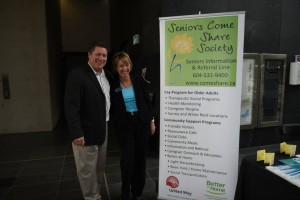 To educate our Seniors and the public, forums are conducted four to six times a year, in our City facilities. Speakers are invited to deliver short talks on subjects such as personal safety, elder abuse, wills, power of attorney, fire safety and financial abuse, to name just a few.
To educate our Seniors and the public, forums are conducted four to six times a year, in our City facilities. Speakers are invited to deliver short talks on subjects such as personal safety, elder abuse, wills, power of attorney, fire safety and financial abuse, to name just a few.
There are also resource tables set up, that provide informational handouts and other resource information for those in attendance. There are also some light snacks, beverages and a lunch provided for those who are there for these six-hour sessions. The forums are presented in different locations throughout the City and delivered in different languages to suit each community.
In addition to the forums, the Committee has created a successful Community Outreach Program for our Seniors. This program is mobile and delivers two-hour programs in locations for those who are not always able to attend one of our larger forums.
The Committee worked for a number of months with staff and the public in creating an “Age Friendly Strategy”. In May of 2014, the SAAC made a presentation to Council on the results of this work and submitted a 38 page document for their consideration. The document can be found at:
https://www.surrey.ca/files/AgeFriendlyStrategyForSeniors.pdf
My goal is to ensure the vision of the Committee is preserved and the work continues, as our Senior population continues to grow. I look forward to working with this Committee and the Chair, Councillor Barb Steele, in the years to come.
Secondary Suites
Secondary suites have multiple issues that need to be addressed. There needs to be a more consistent By-Law developed and applied. Clayton Heights and the Janice Churchill areas are examples of how the By-Laws are not enforced and/or silent. Fortunately the zoning rules that created the issues surrounding coach houses, have been changed to ensure the garage sizes were increased to allow for parking.
With more people living under one roof in a residential home there is a larger demand on the City’s infrastructure and services. While there are fees attached to a residential home with a secondary suite, the communities were not properly designed to handle the additional population and the problems created by the addition of many secondary suites. Our streets, schools, recreational properties and other services were not developed to accommodate the increased population due to homes with multiple suites.
There are five main factors when looking at the issues around secondary suites:
- Number of suites
- Parking
- Affordability
- Safety for those residing in these suites
- Demand on City resources
The City permits one suite in a house and is taxed at that rate. Additional suites are not permitted, in accordance with our By-Laws, and infractions are rarely enforced.
Parking becomes an issue for the residents who may have mobility issues and for those who need to use the roads for access, including our emergency services.
Affordability refers to the owner of the home who invests in the property, and for the tenant who is looking for a place to reside in the city at an affordable price.
Safety issues can arise when home owners create these suites without a building permit, and therefore are not inspected for safety according to the BC Building Code and BC Fire Code requirements. I am all too familiar with suites that have no egress in the case of a fire and in some cases, no working smoke alarms.
Demand on the roadways, schools, parks and other city services are not easily planned for, without the population numbers of these suites being taken into account.
The City should consider adding to the By-Laws, the requirement of a business licence, at a nominal fee, which verifies there is one suite. The business licence could also address street parking. There should be an incentive for those homeowners to create parking on their property to hold all vehicles respective to that address. The purpose here is to ensure the streets are open enough for all emergency response vehicles, and for homeowners who have visitors from time to time.
If a business license became a requirement, annual inspections from the fire department would be required to ensure general fire safety conditions are being met for those who reside there and the Fire Code is being upheld. Both the Fire Services Act and the City of Surrey Fire By-Laws, permit access to businesses by the fire department for inspections without notice. Homeowners who have suites, in addition to the one permitted, would be required to close the additional suites through a process of attrition. We need to ensure we aren’t displacing those who are in those suites without ample time to find other suitable accommodations.
The ability to offer an incentive for creating off-street parking could alleviate the issue of access for emergency vehicles and for those just trying to navigate the cluttered streets. The next steps could include street parking passes, to motivate the creation of off-street parking spots. This would not affect a low income earner who uses transit but would affect those with multiple illegal suites with vehicles.
I hope these blog posts have provided you with an understanding of who I am, where I came from, and where I want to go.
When you are at the polling station this November, please remember Mike Starchuk and the Surrey First Team.
An Apology
Last week, at an All Candidates Meeting, in one segment, I used the ‘R’ word, to describe a situation. This was reported by the media. At the event, I immediately and sincerely apologized. This was not reported by the media, but has been confirmed to the reporter, by an independent source.
I’m sorry for using it, and I understand the comments and feedback I have received, especially given that my immediate apology wasn’t publicly reported.
I have worked with various organizations that support people with special needs for many years, and I regret my choice of words, during an intense political debate.
I can’t change this, but I intend on moving forward with my campaign, hoping this regretful choice of words is now behind me.
This is not a reflection on my family, nor those I am running with in this election, so please direct any comments or concerns to me.
Crime, Lies And Damned Statistics – Adrian MacNair – The Now Newspaper
Adrian MacNair of The Now newspaper, wrote a great article, exposing some of the fear-mongering and bullying tactics of some OTHER campaigns.
Crime, lies and damned statistics – Surrey Now-Leader (surreynowleader.com)
“I don’t have any objection to offering a plan for crime in Surrey. Where I have a problem is in the inaccurate, misleading and outright lies perpetrated by some candidates seeking office.”~ Adrian MacNair – Author of ‘Crime, Lies And Damned Statistics’ – printed in The NOW Newspaper
“THANK YOU ADRIAN. Finally, one of our local papers has put this information up. The Vancouver Sun also put up an excellent article on Oct 24 including some very easy to read graphs. I have recently been to the all candidates meetings for mayor and councillors and was disappointed at how many candidates were pushing this issue and insisting it is much worse than it is. When one councillor candidate (ret. RCMP) pointed out that this is not the case… that crime rates are down and have been for some time… he was interrupted by remarks from a couple others that were insisting that was not true. Stats Canada doesn’t lie folks. Unfortunately, certain politicians do. Be very careful who you vote for. I for one do not want to return to the crime rates that were pre-Watts and team. (For the record, I have lived here for 40 yrs. Thirty-eight of those, I was a short walk from City Centre/Whalley on residential property. I am probably far more aware of what those crime rates were like than most Surrey residents are today. I noticed a change around the late summer of 2007 and it has continually gotten better.)”
~ – Commenting on The Now Newspaper website
Downtown Surrey BIA – All Candidates Meeting
Last night, at the Surrey SFU Campus, the Downtown Surrey BIA, hosted an All Candidates Meeting for Surrey Council Candidates.
Mike Starchuk and the Surrey First Team were all there, and here are some photos and highlights from Mike’s speeches:
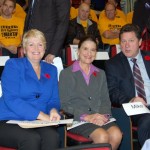 |
 |
 |
 |
“…growing seniors groups are valued, protected and cherished for ideas that they bring forward.”
~ Mike Starchuk – Surrey First Candidate
 |
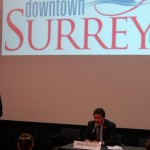 |
 |
 |
“…recovery houses are a priority… and regarding unregistered recovery homes, we need to ensure those in need of treatment, are given the help they need.”
~ Mike Starchuk – Surrey First Candidate
 |
 |
 |
 |
 |
 |
 |
 |
“…in order to be successful with schools, you have to have a successful school board.”
~ Mike Starchuk – Surrey First Candidate
 |
 |
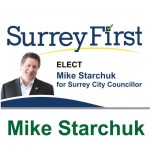 |
“I don’t want to be part of a fractured council, I want to move forward as a team”
~ Mike Starchuk – Surrey First Candidate
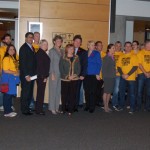 |
 |
 |
 |
